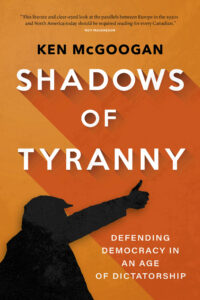Toronto Star highlights Shadows of Tyranny

Big shoutout to the Toronto Star for running an excerpt from Shadows of Tyranny on publication day — today! Special thanks for the terrific play.
From Chapter 9: Mackenzie King Judges Hitler a Saint
In the spring of 1937, Canada’s prime minister was still clinging to the view, originally espoused by British prime minister Winston Churchill, that the greatest guarantee of world peace was a strong British Empire working in concert with the United States. By then, the media baron Lord Beaverbrook, a Canadian expatriate, had become furiously anti-Hitler. And Churchill himself was churning out syndicated political articles warning that the Nazis were rearming for war.
That William Lyon Mackenzie King did not perceive Hitler as a threat to the Empire presents an interesting puzzle. What was wrong with the man? Certainly, he lived in a world of his own. Born in 1874 in Berlin, Ontario—now Kitchener, two hours west of Toronto—young William had grown up worshipping his mother far beyond what might be considered typical of a son, regarding her as a kind of saint. She was the daughter of William Lyon Mackenzie, leader of a failed Canadian rebellion in 1837. The grandson did not lack intelligence. He earned a scholarship to the University of Toronto, where he studied law, politics, and economics. Then he earned a doctorate at Harvard University before returning home to Canada and entering public service. He became a trusted adviser and confidant to Prime Minister Wilfrid Laurier and, after his death in 1919, became Liberal Party leader.
King would become the longest-serving prime minister in Canadian history—twenty-two years over three non-consecutive terms. Having held the office from 1921 to 1930, he regained it in 1935. Two years later, King sailed to London, where at an Imperial Conference he met German ambassador Joachim von Ribbentrop. This man would serve as Hitler’s minister of foreign affairs from 1938 to 1945 and would play such a vital role in creating the death camps that, after the Nuremberg trials, he would become the first war criminal to be executed by hanging.
But now, at the Imperial Conference of 1937, King judged Ribbentrop to be friendly, pleasant, and “a man I could get along with quite easily.” While the two men talked, Churchill happened by and, as King noted in his diary, the German cooled, “indicating, I thought, a sort of feeling that Churchill did not fully understand Germany.” In fact, the British politician was beginning to understand it all too well.

Shadows of Tyranny
Confident that he himself knew better than Churchill, King accepted an invitation from Ribbentrop to add a four-day visit to Berlin to his foray abroad—one that would include a meeting with Hitler. The German ambassador drew up a schedule, and on Sunday, June 27, King arrived in Berlin and checked into the Hotel Adlon. From here, journalists like Matthew Halton and Dorothy Thompson had worked tirelessly to tell the world that the Nazis were building a war machine to wreak havoc on the rest of the Western world.
King wasn’t listening. Since the death of his mother in 1917, he had sought solace and direction in spiritualism, the belief that the living could communicate with the spirits of the deceased. He engaged in seances and tried to contact his mother through mediums. He believed that he received guidance from the spirit world, though he knew better than to let this become widely known. King’s intense belief in spiritualism, rooted in his veneration for his mother, probably made him less discerning than he might have been. But King saw himself as a man of destiny. Not only was he smarter than any mere journalist, but some higher power was guiding him to this meeting with Hitler. He would be the man, almost certainly, to establish a lasting peace with Hitler. All the signs and symbols said so. When he glanced at a clock and saw that the hands were perfectly aligned, that conjunction was indicative. He was on the right track. He could wait in patience.
In Berlin, therefore, on Sunday and Monday, he happily visited the touristic highlights of the city and met a few officials. Then at last the big day came: Tuesday, June 29, 1937. That morning, as he wrote later in his dairy, while leaving the Adlon, the Canadian prime minister sensed “the presence of God in all this,” guiding his every step toward this meeting on “the day for which I was born.” Clearly, he was destined to bring peace to Europe.
After speaking privately with the Nazi leader, King concluded that the Führer was a fellow mystic who spoke the truth when he insisted “that there would be no war as far as Germany was concerned.” Hitler’s face, the King wrote in his diary, was “not that of a fiery, over-strained nature, but of a calm, passive man, deeply and thoughtfully in earnest . . . As I talked with him I could not but think of Joan of Arc. . . .”
To read the rest, pick up today’s Toronto Star. Or, better still, track down a copy of Shadows of Tyranny: Defending Democracy in an Age of Tyranny.